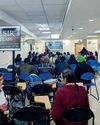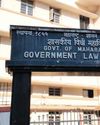
Vasu Goyal, from Roorkee Uttarakhand, earned his MBBS from Ukraine’s Dnipro State Medical University in March 2022. He sat for the Foreign Medical Graduate Examination (FMGE) for the first time in July 2023 and again, in January 2024.
“I could not clear the FMGE on the first attempt. I scored just 84 out of 300 as I could not see the questions properly on the computer screen. I had undergone an operation and was unwell at the time. In my second attempt, I scored 94 out of 300,” he said. He must try again.
Following suggestions from seniors and relatives, Goyal enrolled in a coaching centre at Delhi’s Gautam Nagar. He came to this “FMGE coaching hub” in February and joined Dr Bhatia Medical Coaching Institute (DBMCI). He paid Rs 20,000 for six months, lower than the usual Rs. 30,000 as he was among the top 10 students enrolled. He spends around Rs 15,000 in a month to meet other expenses and accommodation.
In an extraordinarily regimented life, Goyal wakes up at 6 am to revise and get ready for classes that start at 8 am and end at 8 pm. After that, dinner and another round of “self-study”, from 10 pm to midnight, before sleep.
“Gautam Nagar challenges you to give your best,” he said. “It has students from all over the country preparing for the FMGE. I am loving the environment here and hoping to clear the examination in June.”
Most students fail
This story is from the {{IssueName}} edition of {{MagazineName}}.
Start your 7-day Magzter GOLD free trial to access thousands of curated premium stories, and 9,000+ magazines and newspapers.
Already a subscriber ? Sign In
This story is from the {{IssueName}} edition of {{MagazineName}}.
Start your 7-day Magzter GOLD free trial to access thousands of curated premium stories, and 9,000+ magazines and newspapers.
Already a subscriber? Sign In

Sleeper Cells: Law schools' 'dormant' legal aid clinics
A law college survey by the Supreme Court's policy centre found that a worrying number of legal aid clinics do little more than hold legal awareness camps, despite NALSA, BCI rules. This leaves gaps in legal education

Law's new niche frontiers
How niche law programmes are blending science with legal expertise, transforming legal education and creating specialised career paths

'GP Sir's classes' a ray of hope for the poor
Shrishti (name changed), 31, hails from the Valmiki community based in Gurdaspur, Punjab; she was born into a family of safai karamcharis - cleaners and at 21, married into another.

DU Law Faculty is part of CLAT 2025 but plans own exam: Dean
Delhi University's Faculty of Law will admit to its BBA LLB and BA LLB courses through the CLAT exam this year.

Studying law through films, novels, comics
Law schools are using various art forms - films, comics, theatre, puppetry

Legal education meets AI
As artificial intelligence reshapes industries, India’s leading law schools are introducing specialised courses and research initiatives, often in collaboration with technical institutions. But the need for comprehensive regulations persists

A LEGACY IN CRISIS
Asia's oldest law college and alma mater to legal luminaries, Government Law College, Mumbai, now grapples with declining standards, administrative apathy, and students' shifting educational aspirations

Law Colleges for 2025
Careers360 has ranked 100 law colleges and rated over 185 institutions, categorising them into distinct zones and states, for a comprehensive overview of legal education

IIT Madras introduces another quota
After admitting five students via the sports quota in 2024-25 - a first among the IITs Indian Institute of Technology Madras has now introduced another quota for \"fine arts and culture excellence\".

CLAT answer keys and court cases
Many Common Law Admission Test (CLAT) candidates claimed to find mistakes in its provisional and final answer keys.